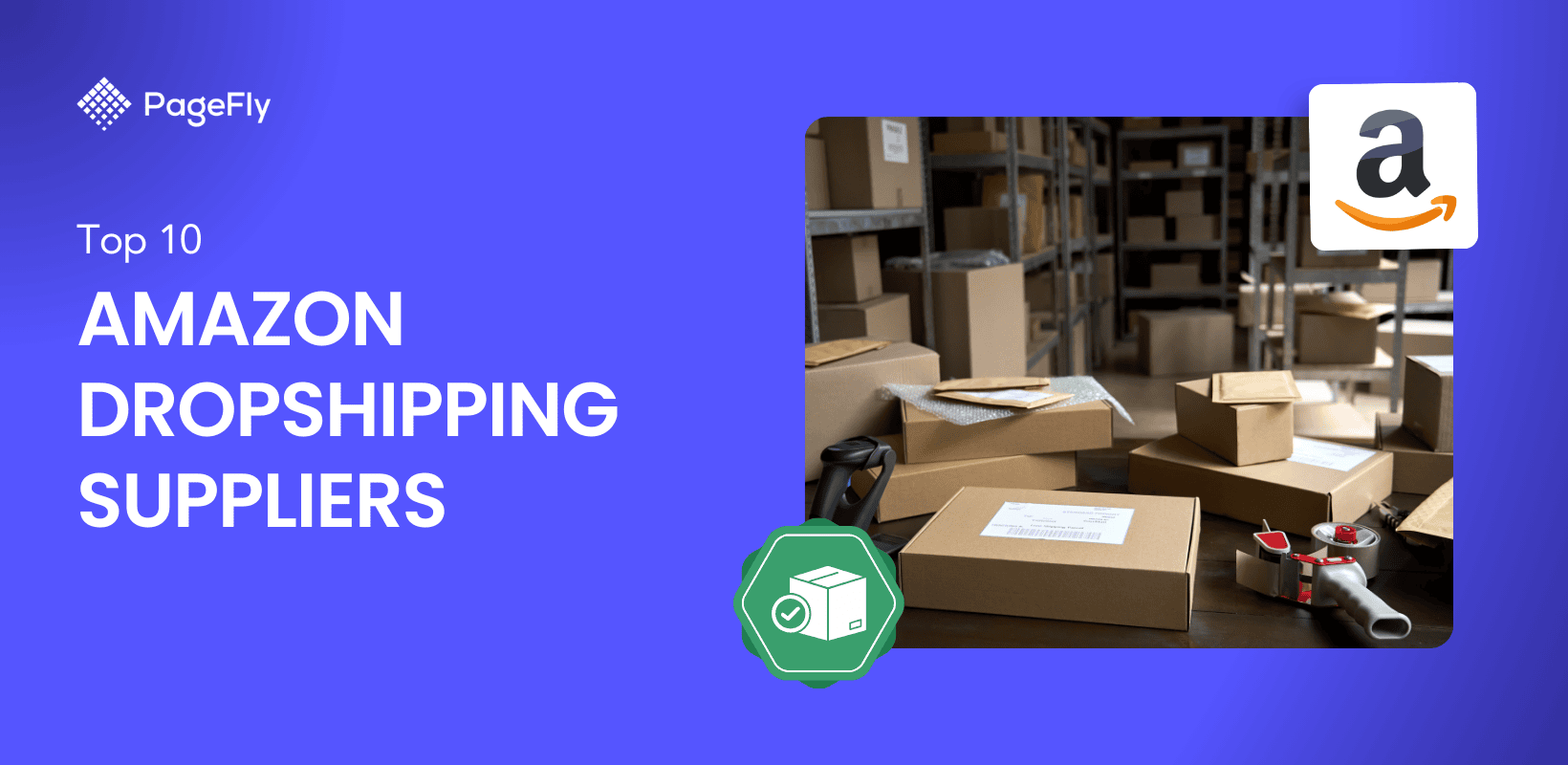We have stepped into 2024 now, and if you want to get more dropshipping sales in the new year, effective marketing is crucial for driving sales and growth for dropshipping businesses. The dropshipping market is competitive so the ability to market your dropshipping venture becomes pivotal to stand out and attract more customers. Let’s explore nine essential strategies to deal with your dropshipping business and boost sales effectively with the following comprehensive guide.
Why You Should Market Your Shopify Store
Marketing is the key to business growth and visibility. It acts as a bridge between your product or service and your target audience. Effective marketing not only increases brand awareness but also drives sales and builds customer loyalty. In a competitive environment, marketing sets you apart by demonstrating your unique value proposition.
Through strategic marketing efforts, you can communicate your brand's story, highlight its benefits, and engage customers across a variety of platforms. It creates conversations that allow you to understand your audience’s preferences and needs, resulting in customized solutions that resonate. Marketing also opens doors to new opportunities, collaborations and partnerships, facilitating the expansion of the business ecosystem.
In the digital age, where information flows rapidly, marketing ensures your offerings reach the right people at the right time. It cultivates relationships and transforms one-time buyers into devoted advocates. That’s why you have to master marketing skills to boost sales for your dropshipping stores.
Top 9 Best Tips for Marketing Your Shopify Store
Now that we have mastered the importance of marketing for your dropshipping store, let’s move on to the best marketing tips.
Tip 1: Understanding Your Target Audience
The foundation of successful marketing lies in understanding your target audience. To effectively reach potential customers, follow these steps:
1. Identifying your ideal customer profile
The first thing to do is to determine your potential customers' demographics, interests, and behaviors. The information will guide your marketing efforts and help you tailor your strategies to resonate with your audience.
You analyze demographic data such as age, gender, location, income level, education, and occupation to understand the characteristics of your potential customers. Moreover, it’s a good way to examine the data of your existing customers to identify common traits and patterns and look for similarities in their demographics, psychographics, purchasing behaviors, and preferences. With this analysis, you can get valuable information about your ideal customer profile.
2. Conducting market research
Then you should conduct market research to understand customer needs and preferences.
You can design and distribute surveys to collect quantitative and qualitative data from your target audience. Online surveys, phone interviews, or in-person questionnaires can be effective tools for gathering information about preferences, opinions, and behaviors.
Additionally, you can conduct one-on-one interviews with individuals from your target market. This qualitative research method allows for in-depth exploration of topics and provides valuable insights into customers' needs, motivations, and pain points.
Also utilizing online analysis tools like Googe Trends or GA can help you understand user behavior, traffic sources, conversion rates, and other metrics to assess customer engagement and preferences.

Source: Google Trends
Read more: Top 15+ Shopify Dropshipping Stores To Learn From In 2024 (Always Updated)
Tip 2. Product Research and Selection
The products you offer have a direct impact on your dropshipping sales. Follow these steps for effective product research and selection:
1. Identifying trending and popular products
You have to stay informed about the latest market trends and identify products that are currently in high demand. Trending dropshipping products have the potential to attract a larger customer base. You can find the trending products via tools like Google Trends, or search on AliExpress for the best-seller list.
2. Evaluating product demand and competition
Next, you can employ tools such as Google Trends and conduct keyword research to evaluate the demand for potential products. Analyze search volume and consumer interest over time to gauge the popularity of specific products. Additionally, assess the level of competition within the market niche to determine your ability to effectively establish a competitive presence.

Source: WordStream
Tip 3. Optimizing Your Online Store
Your online store is your virtual storefront, and its optimization is essential for converting visitors into customers, check these tips for how to optimize your online store.
1. Designing a professional, user-friendly, and appealing website
First of all, you should create a clean, user-friendly website that reflects your brand's identity. A visually appealing site enhances the overall customer experience. A more well-designed or professional site is more likely to turn visitors into consumers. Pagefly.io and dsers.com are good examples of good websites.
Pagefly.io has a user-friendly interface that makes it easy for users to navigate and build pages without any coding knowledge. The drag-and-drop feature allows users to customize their pages effortlessly.
Also, dsers.com streamlines the order fulfillment process by allowing users to process multiple orders with just a few clicks. This feature saves time and effort for dropshippers, enabling them to focus on growing their business.
Pagefly.io and dsers.com are considered good websites due to their user-friendly interfaces, useful features, optimization for conversions and performance, and the value they provide to their respective target audiences.

2. Optimizing product pages for conversions
The next tip is to craft compelling product descriptions, high-quality images, and clear pricing information on your product pages, and showcase customer reviews to build trust. People always make purchases online based on the product information you provide.

Source: DSers
3. Implementing effective product categorization and search functionality
Then, you’d better organize your products into relevant categories and ensure customers can easily find what they want, attracting your customers to return to you again. You can implement a user-friendly search feature to enhance navigation, helping visitors to find what they want quickly.

Source: DSers
Quick read: Amazon Dropshipping Suppliers: Our Top 8 List
4. Streamlining the checkout process for a seamless customer experience
Last but not least, the checkout page should be well-optimized. You should minimize friction during checkout by offering multiple payment options, a guest checkout option, and a secure payment gateway. An intuitive and hassle-free checkout experience can prevent cart abandonment.
Tip 4. Leveraging Social Media Marketing
Social media platforms offer a powerful way to connect with your target audience and build brand awareness, here is how to use social media marketing to attract more customers:
1. Identifying the most relevant social media platforms for your target audience
Social media is a good way for you to learn about your potential customers, so you’d better research which social media platforms your potential customers frequent the most and focus your efforts on these platforms to maximize your reach.
2. Creating engaging and shareable content
When it comes to a content strategy, you should write a mix of informative, entertaining, and promotional content. Sharing engaging content on these social media platforms encourages likes, shares, and interactions. Once you have gained your potential customers’ insights, the sales will come to you, too.
3. Utilizing influencer marketing to reach a wider audience
Lastly, you should work with influencers since popular influencers have a large audience and followers, which will help you gain more followers or likes. Partnering with influencers or micro-influencers with a strong presence in your niche could gain more exposure for your products. Influencers can help you reach a larger audience and build credibility.

Source: TikTok
Tip 5. Implementing Email Marketing Strategies
Most people never ignore the importance of email marketing which helps nurture leads and drive sales for dropshipping stores:
1. Collectinng and creating an email list of your potential customers
The first step to implementing email marketing is to collect and create an email list that targets your potential customers. You can encourage visitors to subscribe to your email list by offering incentives such as discounts or valuable content. An email list allows you to engage with potential customers directly.
2. Creating compelling and personalized email campaigns
After you get the email list, it’s time to craft email campaigns that resonate with different segments of your audience. Personalized content increases the likelihood of engagement and conversions.
3. Analyzing email marketing metrics to optimize performance
While starting email marketing campaigns successfully, you should regularly analyze key email metrics like open rates, click-through rates, and conversion rates to maintain long-term success. Use these insights to refine your email marketing strategies and improve overall performance.
Tip 6. Utilizing Paid Advertising
Paid advertising is a strategic approach to reach a larger audience and generate more dropshipping sales. Here's how you can effectively leverage paid advertising:
1. Choosing the right advertising platforms (e.g., Google Ads, Facebook Ads)
Now, it’s time to talk about the advertising. It’s better to select advertising platforms that align with your target audience's preferences and behavior. Right advertising platforms mean you target your potential customers well, then your sales will be increased. Google Ads and Facebook Ads are popular choices due to their extensive reach and targeting options.

Source: Facebook
2. Monitoring and optimizing ad performance
After you have chosen the platforms and found the targeted audience, you also need to monitor the performance from time to time. Regularly monitor the performance of your paid ads. Analyze metrics such as click-through rates, conversion rates, and return on ad spend (ROAS). Then based on the insights you gather, you have to adjust your campaigns from time to time.
3. Retargeting strategies to reach potential customers who have shown interest
Moreover, implementing retargeting campaigns is a formal and effective strategy to re-engage potential customers who have previously interacted with your website or products but have not yet made a purchase. Retargeting serves the purpose of maintaining brand visibility and actively encouraging conversions. By employing this approach, you can strategically keep your brand at the forefront of customers' minds and entice them to complete their desired actions.
Tip 7. Implementing Search Engine Optimization (SEO)
Search Engine Optimization (SEO) is crucial for improving your website's visibility on search engines and driving organic traffic. Here's how you can effectively implement SEO:
1. Conducting keyword research and optimizing product descriptions
You can perform comprehensive keyword research to identify pertinent terms and phrases that potential customers are likely to employ during their product searches. By integrating these keywords strategically, you can optimize your product descriptions and website content, thus elevating your search engine rankings and enhancing visibility to your target audience.
2. Optimizing website structure and navigation for search engines
Next, it’s time to devote attention to optimizing your website's structure and navigation to ensure a seamless user experience while catering to search engine algorithms. Employ clear and concise headings, employ proper URL structures, and optimize images to enhance the overall usability and discoverability of your website within search engine results.
3. Building high-quality backlinks to improve search engine rankings
Also, you should focus on establishing a network of high-quality backlinks originating from reputable and contextually relevant websites. Acquiring backlinks from authoritative sources signals search engines to perceive your website as trustworthy and authoritative as well, positively impacting your search engine rankings and overall online visibility.
Tip 8. Building Trust and Credibility
Building trust and credibility is essential for gaining the confidence of potential customers. Here's how you can establish trust:
1. Showcasing customer reviews and testimonials
Positive feedback from satisfied customers serves as social proof and encourages others to make a purchase. So you should display real customer reviews and testimonials on your website, and then your visitors are more likely to become your stable customers.
2. Offering secure payment options and clear refund policies
Most importantly, you need to provide secure and convenient payment options to reassure customers about the safety of their transactions since everyone cares about money. Also, clear refund and return policies demonstrate your commitment to customer satisfaction, so you should focus on the policies, too.
3. Providing excellent customer service and support
Ensuring a positive customer service experience plays a pivotal role in cultivating trust and fostering customer loyalty. You can provide responsive and dependable customer service to promptly address customer inquiries, concerns, and issues.
Tip 9. Analyzing and Optimizing Performance
Regularly analyzing and optimizing your marketing efforts is essential for continuous improvement. Here's how you can ensure your strategies are effective:
1. Tracking key performance indicators (KPIs) to measure marketing effectiveness
Key performance indicators show how your customers think of your products so that you can know the product's value, conversion rates, etc. Monitoring KPIs provides insights into the success of your marketing campaigns.
2. Conducting A/B testing to optimize landing pages and marketing campaigns
A/B testing helps you compare different versions of landing pages, email campaigns, and advertisements. It’s a good idea to implement A/B testing to identify which variations perform better and make data-driven improvements.
3. Using analytics tools to gain insights and make data-driven decisions
After you get some outcomes, you should analyze them to get more insights and sales. You can leverage analytics tools to gather valuable insights about user behavior, website traffic sources, and conversion paths. These insights will guide your marketing strategies and enhance your decision-making process.
Conclusion
Effective marketing strategies play a vital role in driving dropshipping sales and growing your business. By understanding your target audience, selecting the right products, optimizing your online store, leveraging social media, implementing strategic email marketing, utilizing paid advertising, implementing SEO practices, building trust and credibility, and analyzing performance, you can create a comprehensive and impactful marketing approach. With these strategies in place, you'll be well-equipped to attract more customers, increase conversions, and achieve success in the competitive dropshipping landscape.
Explore more, check out: Trending Products for Dropshipping in 2024: Unveiling the Best Products to Dropship in Top Niches











